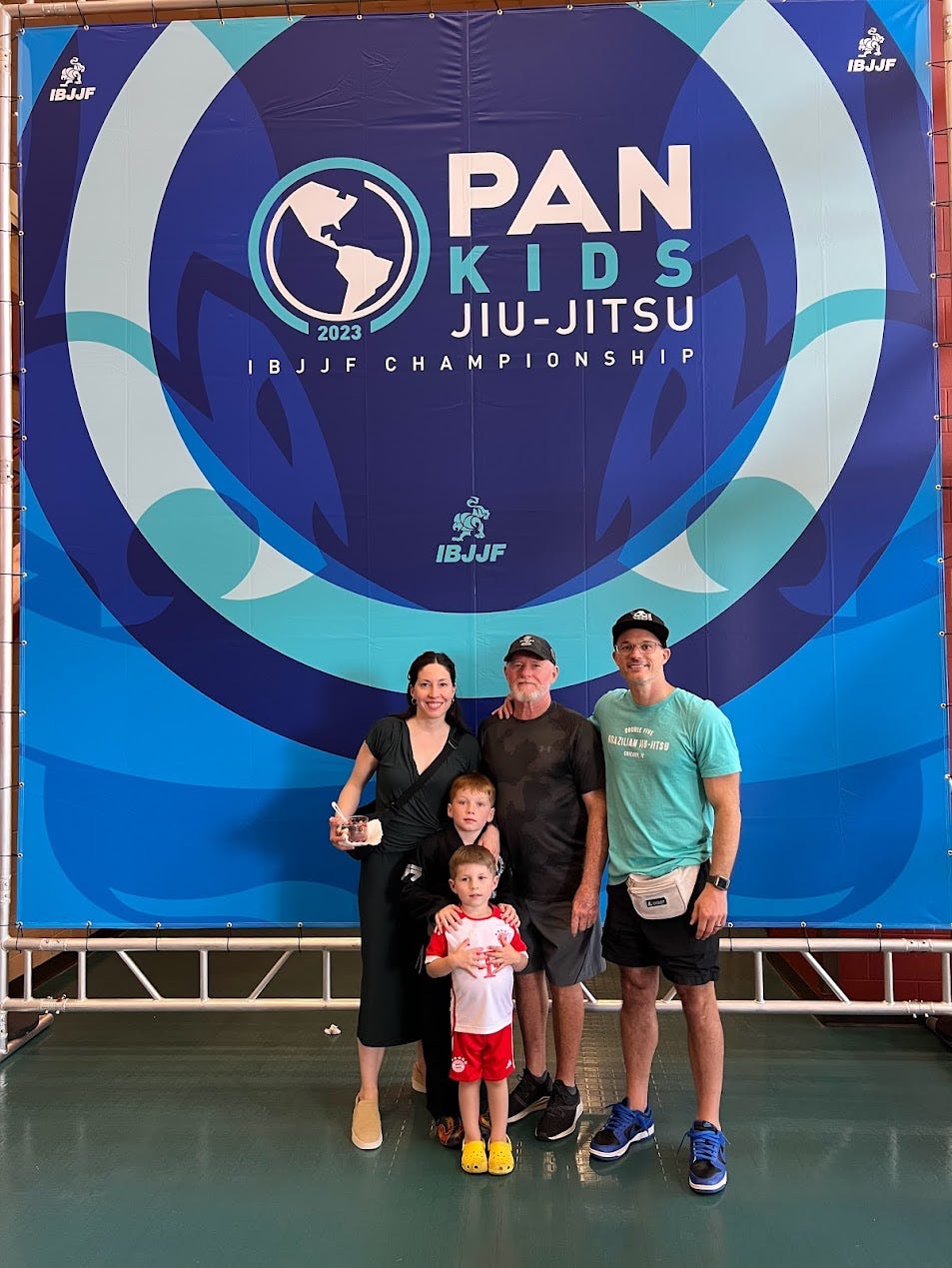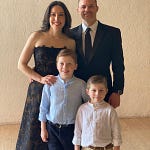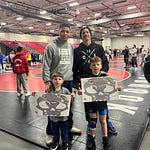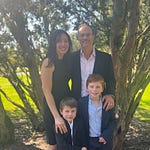🔥Welcome to Volume #00106!🔥
I’m Christian Champ. This is ☯️The Middle Way Newsletter ☯️. It is a place where I write, explore, share, and invite you along for the journey.
If you enjoy the newsletter, please share it with your friends.
⚙️Why We Need to Know When to Make Shift Happen ⚙️
"I want my gray New Balance sneakers!"
“No, Issac, you packed three of your four pairs of shoes,” I firmly replied.
“I want my gray New Balance sneakers!”
The words echoed around the neighborhood at 5:57 am.
I prayed for peace and quiet, but he continued to bomb his demands.
As I pushed him along the Chicago sidewalk to the train, my four-year-old son repeated his request for the entire 420 seconds.
Standing on the train, the screaming finally subsided after an additional 420 seconds of it on the platform.
The train offered the context switch that we needed, and at no point did we hear about the sneakers again.
Kids are great examples because they can't always mask when they need a shift. We get to see live and direct what is happening for them.
We don't scream and cry for 14 minutes when we need to shift. Instead, we ruminate on issues for days, worry about things, and lose sleep. We get stuck in a pattern and fail to break it.
We don't put on the big screeching siren making it clear when we need to shift. Kids make it obvious, and we know.
When it comes to ourselves, we fail to trigger the alarms and miss out on realizing we need to shift.
How can we find when we need to shift?
Notice when you feel fear, angst, regret, or rumination.
Bonus points for journaling on those moments and seeing what strings together.
Track how often certain things repeat. What are your new balance sneaker moments?
What do you need to resolve, reframe or change to get to the shift?
It can be as easy as letting go, like Isaac and his sneakers.
It can be as challenging as stepping into the person you want to be and changing your behaviors.
It can be a reframe around chasing the wrong goals, playing the wrong games, having the wrong scoreboards, or adding more gratitude.
We often need to let go of something we don't want or don’t want enough and change our script.
It can be a quick shift or a longer-term shift. It starts with recognizing the shift is necessary and then making shift happen.
Hopefully, we can see when we need to shift by noticing it or trying out these techniques.
Nothing is worse than being stuck and not having a train showing up for us to reset.
🧠Things to Think About🧠
Paul Graham on How to Do Great Work
The entire piece is worthy of multiple reads and saving it down.
My favorite parts:
First Step: Decided what to work on —> need three things: natural aptitude, deep interest in and the scope to do great work
Figure out what to work on by working (if you don’t know, guess)
Develop the habit of working on your own projects
Look for what you are excessively curious about
When you find this, get on the frontiers of knowledge about it
Find the gaps and question them
The stranger the answers, the better
Chase outlier ideas
When you figure out what to work on, you are on your own
Take action and make things you want to see in the world
Don’t plan too much… planning only works for achievements you can describe in advance
Think of work as per day or per project
Key is consistency … we want work that compounds to create exponential growth
We want ideas that seem crazy, but the right kind of crazy (exciting)
The best questions grow in the answering
Vist with the best people in your field and seek out the best colleagues (1-2 great ones > many pretty good ones)
Great colleagues see things you don’t see and offer surprising insights
Be an optimist and think of yourself as lucky (morale is key and compounds)
Learn the difference between good pain and bad pain
Take care of your physical body (move, eat and sleep well)
Curiosity is the key to doing great work (nurture it and let it drive you)
The whole process is a dance with curiosity
Grant Morrison writes about AI and the Intellectual Development Risks it may create
We need to ensure that we use the tools and that the tools don’t use us. AI provides similar risks to what we see with screens and a lack of physical movement.
How do we ensure we use the tools and the tools don’t use us? I think back to all the things my grandparents knew how to fix. We choose to outsource all that knowledge and understanding to make our lives easier. How do we retain the ability to think well?
The combination of a lack of a need for physical labor to survive and the unprecedented access we have to food, beverages, and entertainments has dramatically impacted the physical abilities of Americans. I could on go for awhile about the health implications of the technological developments of the past century. However, I believe we are coming to a juncture where the intellectual capability of Americans will be in danger due to some recent developments in artificial intelligence. As we have seen in the case of machinery leading to the reduction of physical labor, and a corresponding decline in physical abilities over the past hundred years, I believe we will see the same thing happen with artificial intelligence affecting the intellectual development of Americans.
Gregor writes about Nature’s Wealth
When our pear tree brings gifts at the end of July, we notice how much wealth nature is providing. We get pears to eat, my kids sell them at the park, and the birds, bees, cats, and likely rats all get involved in the feasting.
I started reading Gregor many years ago when I added energy to my industry coverage universe. He showed up early to the renewable transition party and continues to write interesting research.
A simple but important insight from environmental economics is that the economy is a subset of nature, and not the other way around. Because we are a species increasingly adept at the transformation of nature, it’s understandable that humans might evolve to conclude that nature itself is a subset of the economy—you know, like a small grove of lemon trees gracing the perimeter of Apple’s headquarters in Cupertino. But no, as it turns out, without nature Apple’s clever consumer devices don’t exist either, nor do the people to purchase them. Playing around with these two views, you can glimpse how human beings are inclined to think: nature operates in the background, constantly refreshing its supply for our benefit, and we can therefore pluck as many lemons as we like—for we are the ones in charge.
Many times we don’t see the change until it is obvious, and then everything reprices (see the housing bubble blowing up). Life is nothing but always changing, and seeing the change can is challenging.
If nature’s wealth is starting to erode, then our future expected profits are not going to arrive as expected. You can actually think of profit in biological terms. The beaver expends effort to build a dam, and in the process secures a viable home while creating a back-up pond that flowers with renewed diversity—from which they also benefit. A more simple example: the cheetah expends energy to chase and catch smaller prey. As long as the energy consumed is greater than the energy expended, the cheetah enjoys a caloric profit, and lives to hunt another day. But as Woody Allen might say, “what we have here is a dead cheetah.” (see: Annie Hall, a relationship is like a shark, it must always be moving forward, and what we have here is a dead shark.)
Coming back around to a topic often covered here, Condon also addresses the likelihood that some portion of 20th century infrastructure will increasingly find itself…let’s use a British term here: unfit for purpose. Rail lines buckle. Pipelines fail. Utility transmission lines start forest fires. Corporate property gets flooded. And so on. Problems with grid stability in both California and Texas for example has led persons of a certain political persuasion to conclude that EV coming on to the grid must be the cause of blackouts, in addition to the variability of wind and solar. But it’s wind and solar, built in the 21st century, that are actually saving Texas and California from problems with their 20th century infrastructure.
🎧Things to Listen, See, and Watch 🎧
Michael Meade offers a view of “A True Path in Life” on his podcast Living Myth
My Snip AI-generated notes are below. To listen to them, click here.
1. Buddhism holds a philosophy of the illusory nature of life and death, emphasizing finding a genuine path to self-discovery.
2. The search for truth is really the search for one's true self, and it comes from within.
3. Encounters with fate and death awaken people to the value of life beyond societal norms or famous figures.
4. Taking on leadership and protective roles requires courage, reflection, and an appreciation for life's preciousness.
5. Finding one's own path in life requires acting with courage, reflection, and deep self-understanding.
6. Failure to become oneself removes something unique from the world and diminishes its richness.
7. Not everyone is destined for the same roles in life, but failing to become one's true self deprives the world of something special.
8. The search for truth and self-discovery requires introspection and looking deep inside oneself.
Lindsay Gibson talks with Dan Harris on the Ten Percent Happier Podcast about How to Disentangle from Toxic People
My AI-generated notes. (link to listen to the full version of my notes)
1. Emotional immaturity is a separate line of development that becomes evident under stress or in emotionally intimate relationships. Other areas of life may appear normal for emotionally immature individuals.
2. People with emotional immaturity tend to be self-preoccupied, lacking empathy and self-reflection. They struggle to understand others' perspectives and take responsibility for their actions.
3. Emotionally immature people lack self-reflection and blame others for their problems. They struggle to change and fear emotional intimacy. They avoid deep conversations and deflect personal questions.
4. They avoid emotional intimacy and struggle to empathize with their child. They interpret reality based on their feelings, even if it doesn't align with the actual situation. This approach is immature and unreliable for navigating adult life.
5. This text discusses the pitfalls of relying solely on our own feelings and intuition to navigate adult life. It highlights the importance of having an external objective perspective to interpret reality. It also mentions how emotionally immature individuals tend to deny, dismiss, or distort uncomfortable truths.
6. In emotionally immature relationships, one person becomes responsible for stabilizing and boosting the other person's self-esteem. This can be exhausting as it requires constant attention to the other person's emotions. It's important to set boundaries to avoid becoming an 'energy vampire'.
Here are my personal AI notes from the snip app from Douglas Rushkoff’s Team Human podcast featuring Gabriel Kennedy, who recently completed a biography of Robert Anton Wilson.
My AI-generated podcast snips are below (link to listen to them).
1. General semantics, developed by Alfred Kurzipsky, offers an alternative way of understanding the world.
2. Bob encouraged using E prime language*** to expand perspectives and have more meaningful conversations.
3. Bob believed in recognizing that concepts are social constructions and expanding perspectives through language.
4. Bob's transformation over the years shaped his perspective on belief and the reader's experience.
5. Projection is a common issue in today's digital age.
6. Bob had the ability to contextualize and own his thoughts and actions.
7. The internet provides a platform for constant projection.
8. Millions of people now believe in conspiracy theories that were once considered jokes.
9. Bob's story explores the concept of masculinity and challenges societal expectations.
10. Bob believed that being a good person makes someone masculine, regardless of their testosterone levels.
11. Bob encouraged people to be true to themselves.
12. Connect with others and embrace different aspects of yourself as Bob did.
13. Be open to new realities and come out stronger on the other side.
14. Learn to ground yourself in the present moment and find your true identity amid the chaos of the digital age.
15. True identity is constantly changing and fluid.
16. Bob emphasized the importance of seeing oneself as part of a greater whole.
17. Language is like acid, constantly struggling to accurately describe the immense infinity of amazing things happening within and outside of us.
***The quote below was given by Robert Anton Wilson when talking about E Prime.. “…We’re trapped in linguistic constructs. All that is, is metaphor. I believe somebody said that before me. I’ve decided we can’t get beyond words, what’s we’ve got to do is get more cynical about our words. You’ll find that by dispensing with “is,” and trying to reformulate without “is,” you just naturally fall into the kind of expression which is considered acceptable in modern science, and also it’s the type of consciousness that Zen Buddhism tries to exude. Using E-prime you will understand modern science and Zen Buddhism both a lot better than you’ve ever understood them before. Martin Gardiner has written a long essay proving that to think like this will destroy your mind. I think it adds tremendously to clarity. I am removing the “is” from my writing more and more; removing it from your speech is even harder.
Instead of thinking the grass “is” green, I think the grass “appears green to me.” And it saves me a lot of time by the way; I don’t get embroiled in arguments like Beethoven is better than Mozart, or rock is better than soul. I define such things as meaningless and so people get into arguments like that and I just say, well, Beethoven seems better to me than Mozart most of the time, but I don’t say Beethoven “is” better than Mozart.”
💣Words of Wisdom💣
"For maximum results, focus on your biggest opportunities, not your biggest problems." (Kevin Kelly, Excellent Advice for Living)
"The real source of wealth is correct ideas: workable ideas: that is, negative entropy — Information." (Robert Anton Wilson, Prometheus Rising)
"As the great basketball coach John Wooden once observed, "Don't mistake activity for achievement: practice the right way."" (Sally Jenkins, The Right Call)
"In short, where I would have struggled, the villagers simply accepted the situation and went on with their lives." (Michael Crichton, Travels)
"To use the world well, to be able to stop wasting it and our time in it, we need to relearn our being in it. - (Ursula Le Guin)
"Every time I drive past a church in the mountains, it makes me wonder about people who build churches in the mountains. Each of them stood in God's cathedral and thought, what? That a parking lot and some hammered boards could improve matters?" (Steven Kotler, Gnar Country)
"Lowering your price doesn’t make you more trusted. It does the opposite." (Seth Godin, This Is Marketing)
"Just as Ouspensky would conclude years later, Gurdjieff realized that laziness and lack of curiosity allowed people to accept whatever story seemed simplest and freed them from seeking the truth." (Gary Lachman, In Search of P. D. Ouspensky)
"How do you wish to be loved? And what of the earth? We will never be out of relationship with the ecologies we live within, so what is the relationship?" (Nora Bateson, Small Arcs of Larger Circles)
"‘The question,’ she replied, ‘is not whether you will love, hurt, dream, and die. It is what you will love, why you will hurt, when you will dream, and how you will die. This is your choice. You cannot pick the destination, only the path.’" (Brandon Sanderson, Oathbringer)
"It was from him I learned: Let your energy impact the people you're talking to, as opposed to the other way around." (Will Guidara, Unreasonable Hospitality)
"History always repeats itself until we honestly and searchingly know ourselves." (Krista Tippett, Becoming Wise)
🙏Thanks for Reading🙏
What shifts do you need to make happen?
Namaste,
Christian
Alex competed at the IBJJF Pan Kids tournament in Kissimmee, FL. He drew a rough seed of 40th out of 40 competitors since it was his first IBJJF event. He won his first match but then lost to the #1 seed.














Share this post